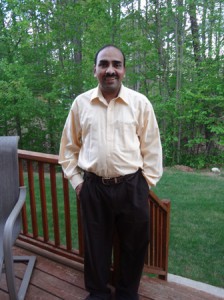By Ed Karvoski Jr., Contributing Writer

Northborough – The American Stroke Association (ASA) observes May as American Stroke Month, a time for people to become better aware of warning signs. Raju Nivarthi and his wife, Aparna, of Northborough recently learned more after he suffered a stroke last October. Now, he’s again driving himself to work and to therapy twice a week.
“He was always very healthy and active around the house and outdoors,” Aparna noted.
Raju is a vegetarian and doesn’t smoke or drink alcohol. He’s unaware of family stroke history, though his father suddenly passed away at age 48.
“When I go to any doctor they tell me my blood pressure is high,” Raju acknowledged, adding that he didn’t have a primary care physician since 2008 when the family moved to Northborough from Syracuse, N.Y.
According to the ASA website, “About three out of four people who have a stroke for the first time have high blood pressure.”
At the time of his stroke, Ragu wakened at 1:30 a.m., feeling dizzy and thirsty.
“I felt a very hot sensation and wanted water,” he recalled. “I drank all the water upstairs in the bottle, then came downstairs. When I was coming downstairs, my right leg was skipping. It only happened one time.”
This wakened Aparna.
“I saw that he walked differently, but he was talking with me normally,” she relayed. “He felt dizzy and was going to make some lime juice.”
As documented at blog.heart.org, “People who are well hydrated at the time of their stroke have a greater chance of better recovery,” according to research presented at this year’s ASA International Stroke Conference.
Aparna joined Raju downstairs with the phone to call 911. Initially, he wanted to wait and see if his condition changed. Soon after, his right limbs became increasingly weak and they called for an ambulance.
Emergency medical technicians arrived and took him to Marlborough Hospital. Two hours later, he was transferred to UMass Memorial Medical Center in Worcester. He had difficulty with speech and language for several days, Aparna noted.
“I came home and he called on the phone, and I didn’t know what he was saying,” she said. “He wasn’t saying any words that made sense to me.”
Other stroke-related deficits were evident when Aparna visited him with their children, both college students.
“I was mixing up people’s names,” Raju relayed. “I knew my wife, son and daughter were there and I recognized them, but I couldn’t tell them their names. It took about a week for knowing their names to come back.”
Five days later, Raju was transferred to Whittier Rehabilitation Hospital in Westborough for three weeks. There, he gradually gained an understanding of the stroke’s impact. He participated in occupational and physical therapy with increasing commitment.
Raju previously worked as an assistant professor, a scientist, and he’s now an associate director at a pharmaceutical company. He felt motivated to improve his mobility and return to his usual everyday activities. Yet, he acknowledges that the process has been frustrating.
“During the three weeks I learned how to walk, but slowly and carefully,” he said. “I am also paying attention to my body. And my friends tell me they’re paying attention to their health now, too.”
Now, he also has a primary care physician and has purchased a blood pressure monitor.
This past winter, Raju found it difficult operating his snow blower with his right hand, so he opted for shoveling with intervals of rest.
“If your body allows you to do hard work, then you should be happy,” he said.
For more information, including warning signs of a stroke, visit www.strokeassociation.org.














